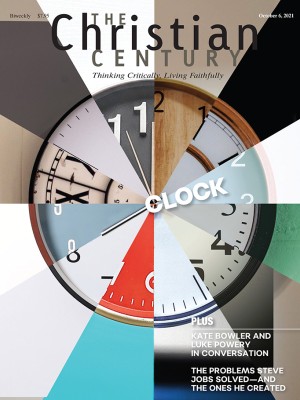October 17, Ordinary 29B (Job 38:1-7, 34-41)
I don’t want to hear any more from Eliphaz, Bildad, or Zophar. I want answers.
By the time we get to the 38th chapter of Job, I’ve nearly lost my patience with all the talking. There has been a whole lot of talk about, well, not much. I know that Job has gone through a lot. I recognize his pain and his anguish, and anyone who has lived any length of time on this earth knows something about suffering, but I don’t personally want to hear from his friends about what they think it all means.
They are taking shots in the dark about what is going on. They assume and assert more about God’s ways and actions than I care to read about as I’m attempting to manage my own suffering. I am especially dyspeptic to this kind of talk amid the COVID-19 pandemic. This global tragedy has given platform to many an Eliphaz, Bildad, and Zophar, theological commentators without much training, disciplined devotion, or humility pontificating about what it all means, who is to blame, and how any particular group’s actions have led to their own suffering or the suffering of others or even this global pandemic. I’m fed up and do not want to hear any more.
Read our latest issue or browse back issues.
So 37 chapters of this kind of conversation is more than enough for me; now I need answers. I’m ready for God to come and prove Job right by offering some rationale for all his afflictions—or to come and prove Job’s friends correct and provide a pathway for Job’s repentance. Either way, at this point readers are starved for God’s voice, for a tangible indicator of God’s presence. So when our passage begins with an acknowledgment of God’s presence and forthcoming answer from the whirlwind, relief washes over me. I am hoping for a satisfactory summation from God that will answer all the questions, questions that we desperately need answered today.
At first glance, God’s response leaves much to be desired. God does not answer Job’s questions nor those of his friends. God does not even acknowledge Job’s suffering. Instead, we get a crash course in cosmic history that takes Job back to the very foundations of the world, which God makes sure to remind Job he was not present for. The latter section of our passage further delineates the difference in power between God and Job by telling Job of his inability to control the wonders of the world.
Is this a flex by God? Is this the loving God that we know, puffing out their chest and putting Job in his place? Is this the response we need when managing our own suffering? We aren’t God, we weren’t there, and we can’t make lightning? It angers and pains me.
But then, when I come back to this text with a bias toward love—that is, a lens that foregrounds my sense that God does indeed love and care for us—this passage is more comforting. What if instead of reading this primordial history lesson as God’s gloating, we recognize it as God’s assurance that we don’t—and won’t—understand this world in which we live?
Like Job, I want to live in an “if-then” kind of world. If I do good, then I’ll be rewarded; if I do bad, then I’ll face the consequences. But we know—from Job’s story and our own—that this is not the case. There is too much evil that prospers and too much good left unrewarded. Too many people are being made destitute during a pandemic while a few further fortunes even their progeny won’t be able to spend. This world does not work in a way that I understand or can even wrap my head around.
And by eavesdropping on this conversation with Job, we receive the same hope he receives: that God knows the ways of this world and has a kind of control that we can’t fathom. God speaks of the foundation of the world, its measurements, the joy that shone when it was formed, provision both for the land and for the animals. This is an assurance that though we can’t see or fathom it, God has a system of order and provision in which we can find comfort and even joy.
God’s grandeur in this text points to a system that is beyond the conditional understanding that Job and his friends know. While it may be important to be pious, piety is not an indicator of one’s position in life. It is good to be reminded that the issues we face often aren’t the result of what we’ve done. Actions have consequences, but in a world as sinful as ours many of the consequences we face have nothing to do with us.
God paints a picture of a world with deep structure beyond our cognitive grasp. It’s comforting—and a bit disconcerting. What do we do with the tension between this underlying order and the fact that tragedy happens to many without cause?
There is no direct answer to this question in our passage, but I take comfort in God’s conversation. God answers Job’s questions with questions—and I am comforted by the fact that a God who has the power to create the world’s foundations takes time to converse with Job. Making sense of this world is an ongoing endeavor, unanswered by any one sermon, devotional, or study. I’m glad to know that we serve a God who refuses to allow the conversation to end.





